Postgres in Malmö: Powered by Elly Phneah
What do tech journalism, PR, and PostgreSQL have in common? For Elly Phneah, the answer is community. Based in Malmö, Elly is the driving force behind the Malmö Postgres User Group (M‑PUG, for short), where she combines her background in communications with a deep passion for databases and developer communities.
Author
Natalia WoroniecDate published
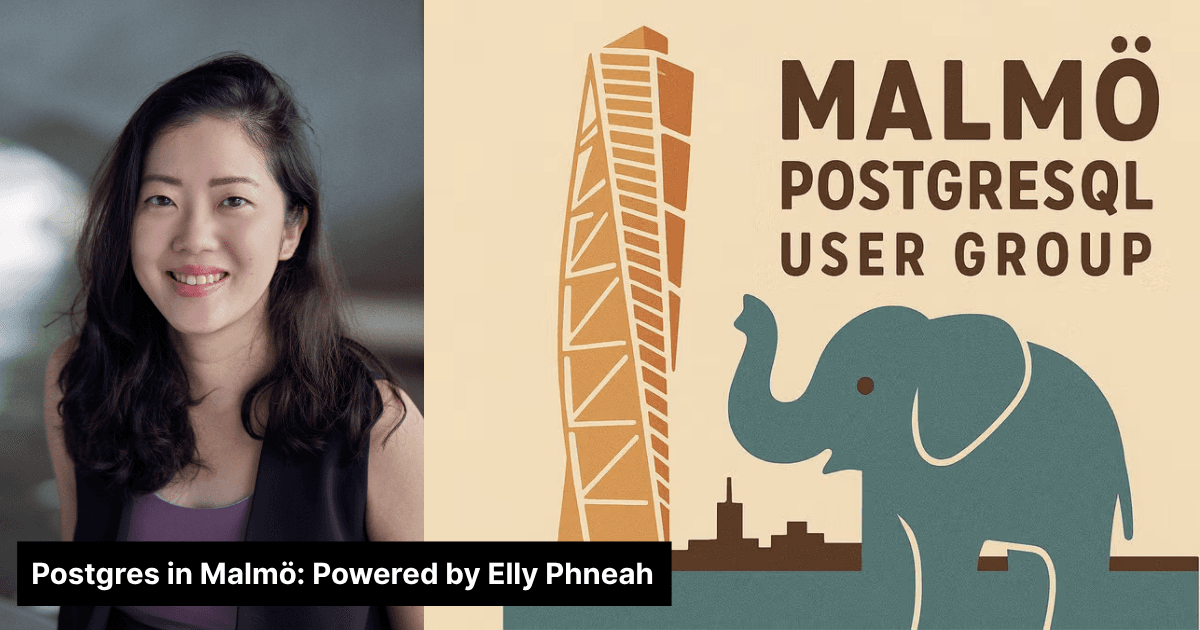
Through Malmö PostgreSQL User Group, Ellyne Phneah has helped put Malmö on the map for database meetups, creating a consistent, welcoming format and platform for both seasoned speakers and first-timers alike.
At the upcoming edition of M‑PUG on August 19th, one of those first-timers is Xata’s own Martin Hansen, who will be debuting his talk Running PostgreSQL on Kubernetes at Scale: Lessons from Adopting CloudNativePG. He’ll share how and why Xata chose the CloudNativePG operator to power its managed Postgres service, and what we’ve learned from running it in production. Curious to learn more? Check out the full details and RSVP for the August 19th meetup here.
Before the event, we caught up with Elly to hear more about her path into tech, what goes into running a great local meetup, and why community work matters. Her reflections, below.
Your path has spanned tech journalism, PR, and now community leadership in the Nordic PostgreSQL scene. What personal experiences shaped your decision to found and lead M‑PUG?
My journey has been about connecting people and translating complex ideas across different contexts. Starting as a tech journalist at ZDNet covering APAC enterprise technology trends, then moving into PR and communications for cybersecurity and fintech brands, I learned how to identify what matters to different audiences and create meaningful conversations around technology. This translation work continues today - I'm currently writing a book called 'Decode PostgreSQL' that explains PostgreSQL simply to non-technical people, and I'll be speaking at PGDay UK 2025 about 'Explaining PostgreSQL like I'm Five (or 85)' because I believe the best technology should be accessible to everyone.
When I moved to Sweden in 2021 and joined DBtune in 2023, I discovered this incredible PostgreSQL ecosystem but noticed Malmö lacked a dedicated user group. Having spent 12 years building bridges between technical communities and broader audiences, founding M-PUG felt like a natural evolution. My background taught me that great technology thrives when people can share knowledge freely—whether that's journalists understanding enterprise trends or developers optimizing database performance.
The decision was also shaped by my belief in what I call "distributed leadership"—something I learned works well in the Nordic context. Rather than building a traditional top-down community, I wanted to create space where anyone could contribute insights, regardless of their experience level.
At pgDay Paris and POSETTE, you spoke about "tuning community parameters." How do you approach building an inclusive, high‑energy tech event?
I approach community events like directing a film—you're creating an experience through sequencing moments. It's about mapping intention to structure across time, formats, speakers, and screens. Each speaker is a character contributing to a larger narrative arc, and your attendees are the protagonists moving from ordinary world to transformation through learning. More about this in my blog post here.
For inclusivity, we implement what I call "psychological safety by design." This means creating multiple ways for people to participate—from lightning talks to "show and tell" sessions where anyone can share what they're working on. We deliberately mix experience levels and backgrounds, ensuring speakers represent different perspectives and expertise areas.
The science behind why people stick around is fascinating—something I'm exploring deeper in my upcoming talk "Postgres People: The Neuroscience of Why We Stick Around" at pgDay Napoli 2025. Research shows that sustained community engagement comes from three key factors: psychological safety, meaningful connections, and consistent value delivery. When people feel safe to be vulnerable, make genuine connections, and consistently gain value, they become long-term community members.
For high energy, we've learned that preparation prevents low engagement. We use interactive tools like Slido for live polls and Q&A, plan for contingencies (like backup speakers), and most importantly, we create space for serendipitous connections. The magic often happens during the pizza networking, not just during formal presentations.
The key insight: treat your community like a narrative experience. When you get the pacing, tone, and arc right, people won't notice the scaffolding—they'll just remember how it made them feel.
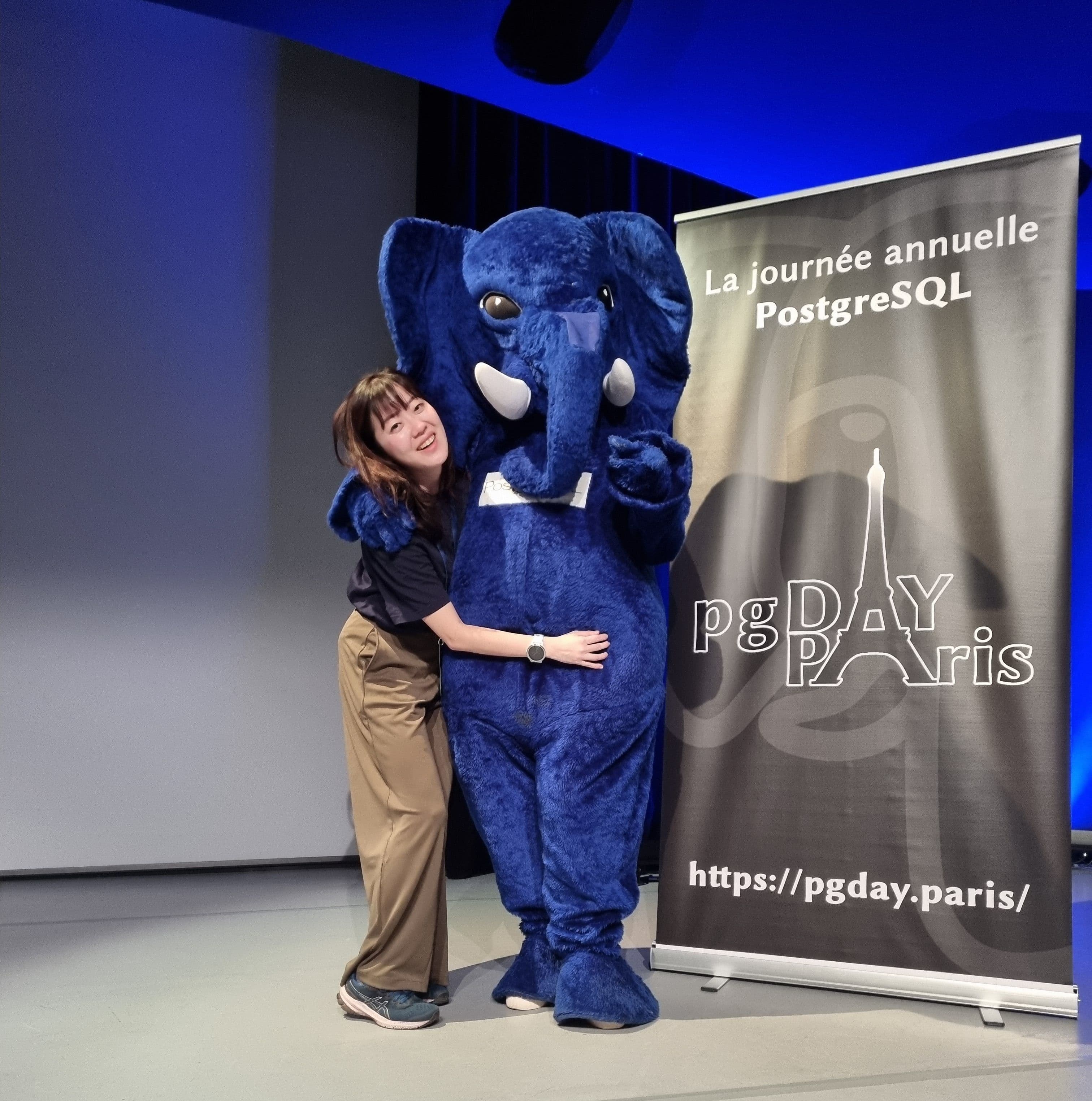
Rubbing shoulder with a Postgres celebrity - Slonik (in this role, a valued member of the Postgres community, Valeria Kaplan)
How did M‑PUG come to life? Can you share the origin story, how it started, who was involved, and what inspired the first meetup?
M-PUG started with a simple observation: Malmö had an incredible tech ecosystem but no dedicated PostgreSQL user group. Working at DBtune, I was constantly learning about PostgreSQL's capabilities and we realized there were probably others in the region facing similar challenges and opportunities.
The catalyst was connecting with Dr. Luigi Nardi at DBtune, Daniel Gustafsson from Microsoft, and Dennis Rilorin from Redpill Linpro. We discovered we all shared this vision of creating a space where PostgreSQL enthusiasts could learn from each other, regardless of their experience level.
What inspired the first meetup was recognizing that Malmö's international character—similar to Singapore in many ways—meant we had people from diverse backgrounds all working with PostgreSQL in different contexts. We wanted to tap into that collective knowledge.
We partnered with Foo Cafe from the beginning, which was crucial. They handled logistics and marketing while we focused on finding quality speakers and creating meaningful content. This division of labor let us concentrate on what mattered most: building genuine connections within the PostgreSQL community.
And an important point to mention is that DBtune generously sponsors part of my work time to help organize M-PUG—something not many employers would do—which made it much more feasible to get the group off the ground and keep it running strong.
What were the first few events like? Where did you host them, and how did you get people in the room that first time?
Our first event was both nerve-wracking and energizing, Daniel Gustafsson, a PostgreSQL contributor and committer, volunteered to give an introductory talk to PostgreSQL and the ecosystem and we had 45 attendees, which exceeded our expectations!
Getting people in the room initially required leveraging our networks and being very clear about the value proposition. I used my communications background to craft messaging that resonated with different audiences—for developers, we emphasized practical learning; for engineering managers, we highlighted knowledge sharing and talent networking.
The partnership with Foo Cafe was invaluable here. We host our events at Foo Cafe, which provides the perfect atmosphere: casual enough for genuine networking but professional enough for technical presentations. They already had an established community and marketing channels, which gave us immediate credibility and reach. We also reached out directly to local companies using PostgreSQL and emphasized that this wasn't just another networking event—it was a chance to solve real problems together.
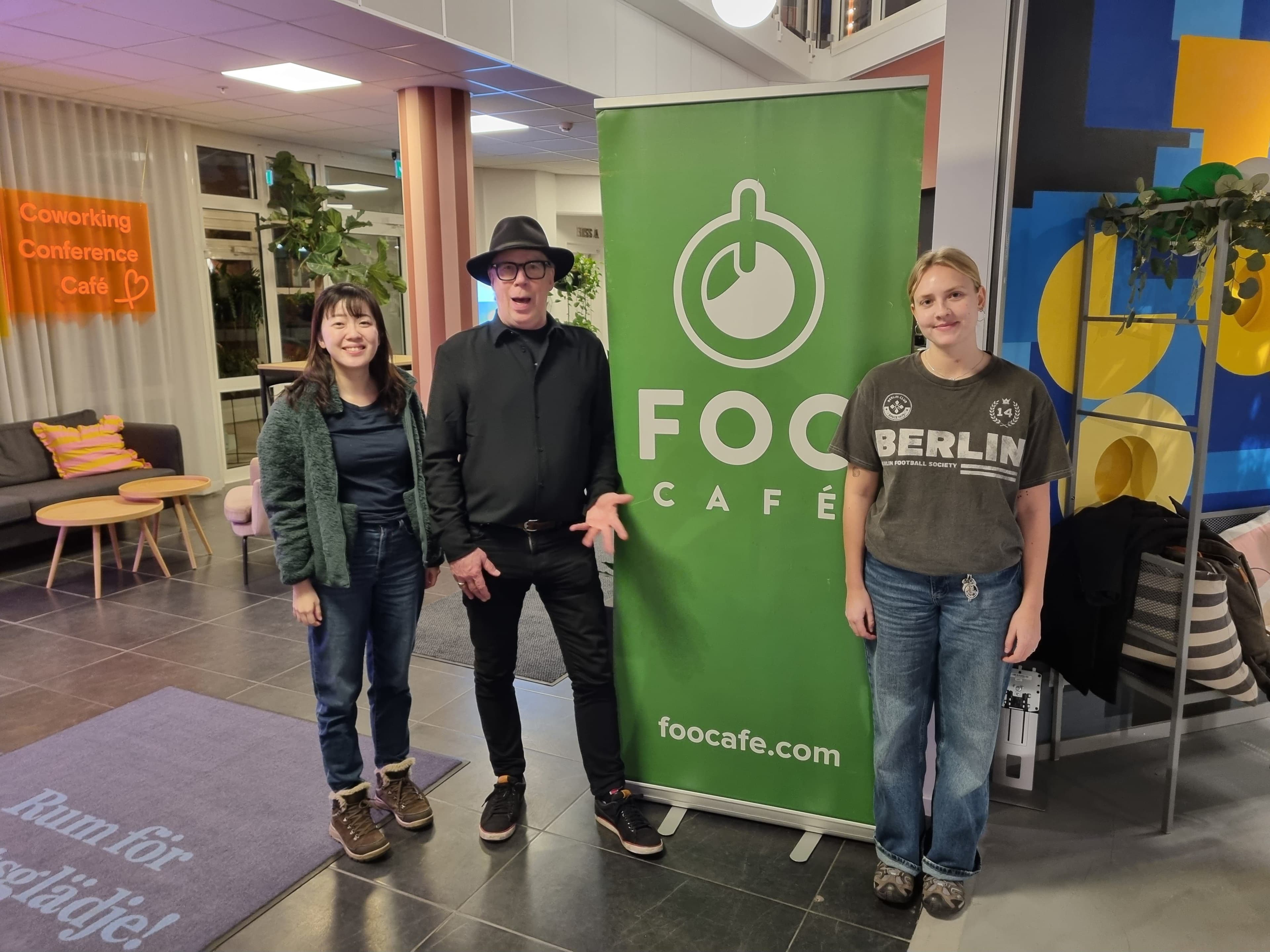
Elly with the Foo Cafe crew: Laura Carmedy and Michael Tiberg
What made the difference was being authentic about our goals. We weren't trying to sell anything or promote specific companies; we genuinely wanted to create space for PostgreSQL enthusiasts to connect and learn from each other.
Now that we've established ourselves, our focus has evolved. We're bringing in international speakers to share cutting-edge insights while actively encouraging local community members to step up as speakers. There's something powerful about supporting someone through their first technical presentation—watching them grow from hesitant first-timers to confident thought leaders. We provide mentorship and feedback to help them craft their talks, because we believe every community member has valuable experiences to share. It's become as much about developing our local talent as it is about learning from global experts.
Had you run any tech communities or meetups before M‑PUG? If not, what gave you the confidence to jump in? And if so, how did that earlier experience shape how you approached this one?
No, I hadn't run tech communities before M-PUG, but I had relevant experience that translated well. During my PR career, I organized press events and product launches, which taught me how to communicate the value of attending events to different audiences as well as various event formats. You learn quickly how to make busy professionals prioritize your event over everything else competing for their time.
Interestingly, my yoga teacher training and sound healing certification during COVID also prepared me for this. Organizing virtual classes during lockdown taught me how to create safe, welcoming spaces where people feel comfortable being vulnerable and learning together. That experience of holding space for others turned out to be incredibly relevant for community leadership.
The confidence came from recognizing that community building shares core principles with communications work: understand your audience, provide genuine value, and create opportunities for meaningful connections. I also embraced the Nordic approach of distributed leadership—rather than trying to control everything, we created frameworks where others could contribute and take ownership.
What is the most unexpected connection you have seen happen at an M‑PUG meetup, over pizza, post-talk, or anywhere in between?
The most memorable moment happened when our scheduled speaker canceled literally 10 minutes before the event started. Instead of panicking, I asked the audience if anyone wanted to step up and present something they were working on.
Surprisingly, someone in the user group who had subject matter expertise volunteered to lead a discussion about Kubernetes and database management. What started as an emergency solution turned into one of our most engaging sessions—completely interactive, with the audience actively participating and sharing their own experiences.
The unexpected part came afterward when one of the attendees in the user group told me: "I was planning to give a Kubernetes presentation next week. This discussion gave me new insights I can now incorporate into my talk." A last-minute crisis became a learning opportunity that improved his future presentation.
This taught me that some of the best community moments happen when you let go of rigid structures and trust the collective knowledge in the room. The formal talks are valuable, but the spontaneous problem-solving sessions often create the most lasting connections.
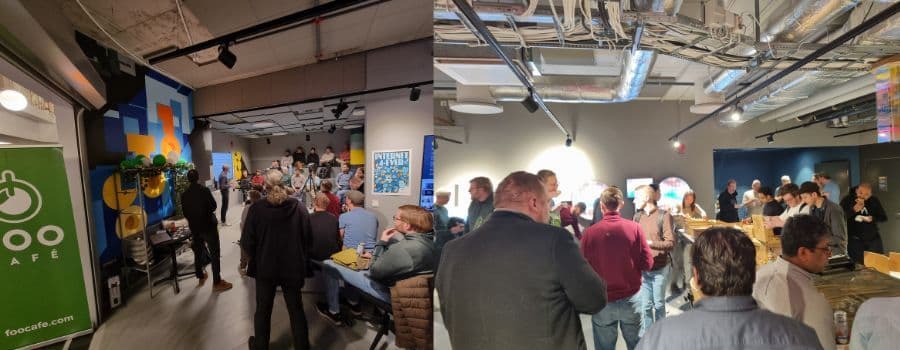
First edition of the M-PUG Meetup, November 2024
How does the Swedish tech community compare to others you have experience with? Is it mostly made up of expats, or is it mainly locals?
Malmö's tech scene reminds me a lot of Singapore—incredibly international with a strong mix of expats and locals collaborating naturally. You'll find Swedish developers working alongside colleagues from Germany, India, Eastern Europe, and beyond. This diversity brings different perspectives to problem-solving, which is particularly valuable in the PostgreSQL community where people are working with the same technology but in vastly different contexts.
What's distinctly Swedish is the flat organizational culture. Junior developers genuinely feel empowered to challenge senior architects, and the best ideas surface regardless of hierarchy. This "psychological safety" creates an environment where innovation happens faster because people aren't afraid to experiment and share failures. You can read more in my blog on Sweden/Nordic work culture.
The pace is more deliberate than the rapid-fire startup culture I experienced in Singapore, but that deliberation often leads to more thoughtful, sustainable solutions. Swedish tech companies tend to embed values like sustainability and trust into their core strategies from day one, rather than treating them as marketing afterthoughts.
For M-PUG specifically, this international character means we get use cases spanning everything from fintech to gaming to sustainability tech—all using PostgreSQL in unique ways.
If PostgreSQL had a magic wand to improve itself, what one change would help communities thrive around it?
I would focus on significantly enhancing the accessibility and ease of performance optimization. PostgreSQL is renowned for its powerful configurability but can be complex, especially for users who aren't seasoned database administrators. Currently, achieving optimal performance often requires a deep understanding of numerous parameters, intricate monitoring, and sometimes, a degree of trial and error. This complexity can create a barrier to entry, preventing some users from fully leveraging PostgreSQL's capabilities or leading to suboptimal performance in production environments.
My ideal change would be for PostgreSQL to have intelligent automation and simplified parameter management. PostgreSQL could incorporate more intelligent, built-in mechanisms for automated performance tuning, analyzing workload patterns and dynamically suggesting or even applying configuration adjustments within safe boundaries. It could also have improved tools and interfaces for monitoring to explain its performance. This includes clearer insights on how specific server parameters could affect performance and offering guidance on potential optimizations.
By making PostgreSQL performance tuning more accessible and intuitive, we can empower a broader range of users to build high-performing and scalable applications.
In this space, my company, DBtune, offers a compelling AI-powered PostgreSQL performance tuning tool. DBtune provides a fundamentally different approach to PostgreSQL optimization. Traditional PostgreSQL server parameter tuning is a complex and time-consuming task, requiring deep expertise and constant monitoring. DBtune automates this process by analyzing PostgreSQL workloads and dynamically adjusting configuration settings to maximize performance. This can lead to significant improvements in query runtime, resource utilization, and overall database stability by automating the optimization of crucial parameters like shared_buffers and work_mem.
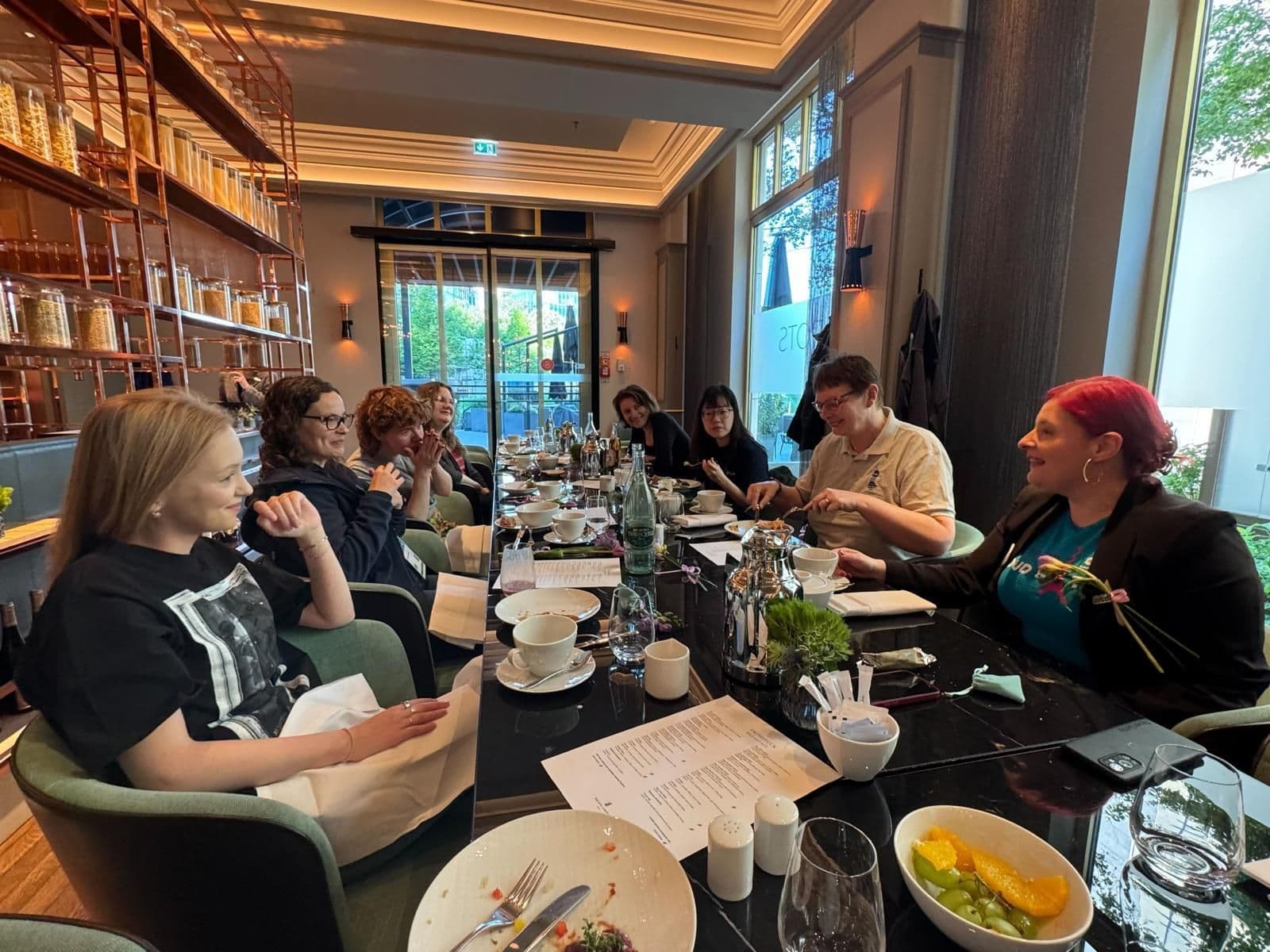
Elly at Xata’s Women in Postgres breakfast in Berlin - May 2025
For someone wanting to start their own PostgreSQL (or tech) user group, what are the three most important first steps?
First: Read the PostgreSQL user group guidelines and understand the requirements. Before you do anything else, familiarize yourself with the official PostgreSQL user group guidelines. These outline the requirements for recognition—like ensuring your group focuses primarily on PostgreSQL, maintains public and inclusive access, and follows a code of conduct. Understanding these frameworks upfront helps you build something sustainable that can eventually gain official recognition from the PostgreSQL Global Development Group.
Second: Find the right partner and create a landing page. Don't try to do everything yourself. Partner with an established venue or tech hub that already has infrastructure and marketing reach. For us, Foo Cafe handles logistics while we focus on content and speakers. Create a simple landing page that clearly communicates your value proposition—what will people learn and why should they prioritize your event?
Third: Focus on what makes people stick around from a neuroscience and psychological perspective, which I’ll cover at my upcoming talk at pgDay Napoli 2025. The science shows that sustained community engagement comes from creating psychological safety, meaningful connections, and consistent value delivery. On top of that, there are also more practical attendance strategies from day one—use waitlist systems, send teaser content before events, and reward consistent attendees. Most importantly, take photos and share insights afterward to create social proof.
The key insight: treat your user group like a product. Understand your users' needs, iterate based on feedback, and always prioritize genuine value over networking theater. PostgreSQL thrives because of its community—your job is creating space where that community can connect and grow together.